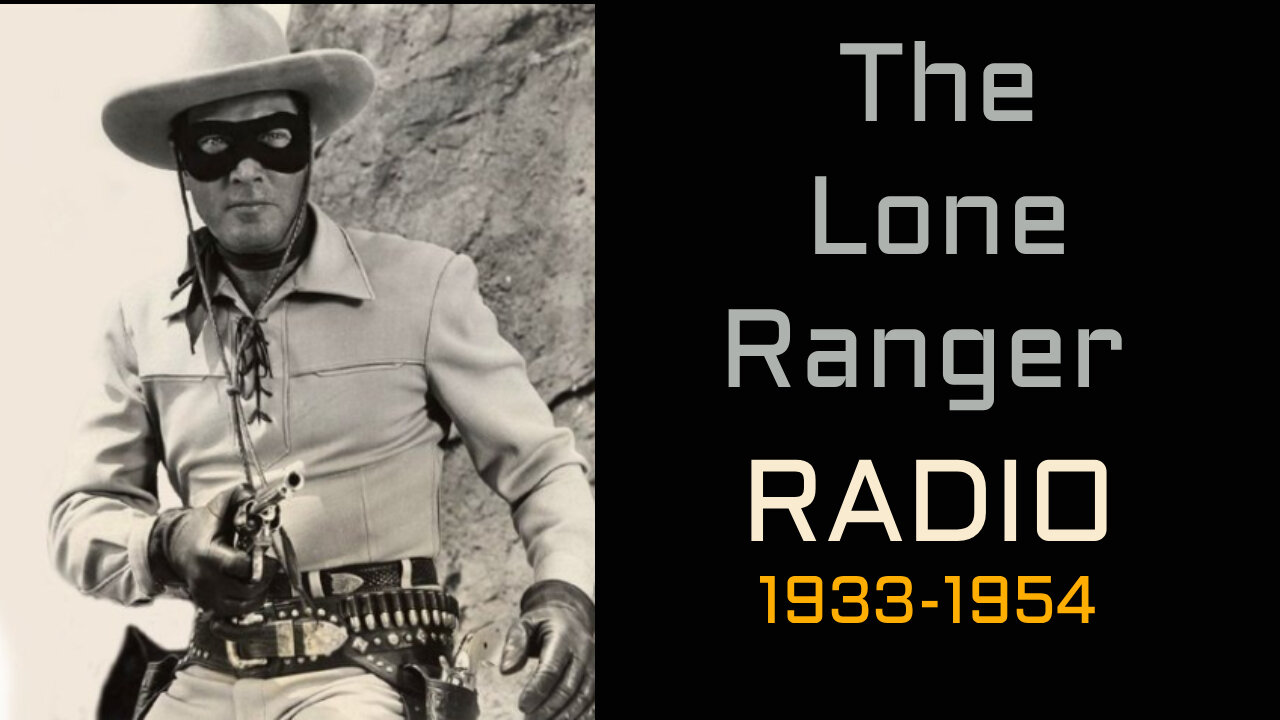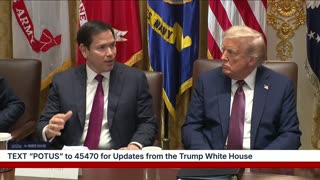Premium Only Content

Lone Ranger 38-05-18 (0828) The Man Least Suspected
The Lone Ranger is a fictional masked former Texas Ranger who fought outlaws in the American Old West with his Native American friend, Tonto. The character has been called an enduring icon of American culture.
He first appeared in 1933 in a radio show conceived either by WXYZ (Detroit) radio station owner George W. Trendle, or by Fran Striker, the show's writer The radio series proved to be a hit and spawned a series of books (largely written by Striker), an equally popular television show that ran from 1949 to 1957, comic books, and several movies.
The title character was played on the radio show by Earle Graser for some 13,000 episodes but three others preceded him, according to The New York Times: "a man named Deeds, who lasted only a few weeks; a George Stenius [actually George Seaton according to the Los Angeles Times] and then Brace Beemer; the latter became the narrator of the program.
Clayton Moore portrayed the Lone Ranger on television although, during a contract dispute, Moore was replaced temporarily by John Hart, who wore a different style of mask. On the radio, Tonto was played by, among others, John Todd and Roland Parker; and in the television series, by Jay Silverheels, who was a Mohawk from the Six Nations Indian Reserve in Ontario, Canada.
Original radio series
The creators of the character were George Trendle (manager of WXYZ radio station) and writer Fran Striker.
The first of 2,956 radio episodes of The Lone Ranger premiered on WXYZ, a radio station serving Detroit, Michigan, on January 30, 1933 or January 31, 1933. As Dunning writes in On the Air: The Encyclopedia of Old-Time Radio:
There may have been a few late-night on-air shakedown shows prior to the official January 31, 1933 premiere date. Lacking concrete evidence, [Lone Ranger authority Terry] Salomonson is inclined to doubt it. "There is nothing in any of the Detroit papers to indicate this, but that in itself doesn't mean much. The papers didn't even list the show in their radio logs at first.
The show was an immediate success. Though it was aimed at children, adults made up at least half the audience. It became so popular, it was picked up by the Mutual Broadcasting System and, on May 2, 1942, by NBC's Blue Network, which in time became ABC.
By 1939, some 20 million Americans were listening to the program. It also had numerous listeners in other countries.
Cast
The Lone Ranger was played by several actors:
• John L. Barrett, on test broadcasts on WEBR in January 1933;
• George Seaton (under the name George Stenius) (January 31 – May 9, 1933)
• Series director James Jewell, for one episode;
• An actor known only by the pseudonym "Jack Deeds", for one episode;
• Earle Graser (May 16, 1933 – April 7, 1941). On April 8, Graser died in a car accident; and, for five episodes, the Lone Ranger was unable to speak beyond a whisper, with Tonto carrying the action. In addition, six episodes broadcast in August 1938 did not include the Lone Ranger's voice other than an occasional "Hi-Yo Silver!" in the background. In those episodes, Tonto carried the dialog;
• Brace Beemer (April 18, 1941 to the end), who had been the show's deep-voiced announcer for several years;
• Fred Foy (March 29, 1954), also an announcer on the show, took over the role for one broadcast when Beemer had laryngitis.
Tonto was played throughout the run by actor John Todd (although there were a few isolated occasions when he was replaced by Roland Parker, better known as Kato for much of the run of sister series The Green Hornet). Other supporting players were selected from Detroit area actors and studio staff.
Music
The theme music was primarily taken from the "March of the Swiss Soldiers" finale of Gioachino Rossini's William Tell Overture, which thus came to be inseparably associated with the series. The theme was conducted by Daniel Pérez Castañeda, with the softer parts excerpted from Die Moldau, composed by Bedřich Smetana.
Classical music was originally used because it was in the public domain, thus allowing production costs to be kept low while providing a wide range of music as needed without the cost of a composer. The incidental music from Liszt's Les Preludes was being used in the 1940s by Germany's Nazi propaganda minister, Joseph Goebbels, as a theme in German weekly news announcements, particularly to dramatize German victories in WWII.
In the late 1930s, Trendle acquired the rights to use incidental music from Republic Pictures motion picture serials as part of a deal for Republic to produce a serial based (loosely) on the Lone Ranger.
This music was then modified by NBC radio arranger Ben Bonnell and recorded in Mexico to avoid American union rules. This music was used in both the radio and later television shows.
-
 1:57:04
1:57:04
Steven Crowder
5 hours agoAdios & Ni Hao: Trump Sends Abrego Garcia to Africa But Welcomes 600K Chinese to America
248K218 -
 LIVE
LIVE
The White House
5 hours agoPresident Trump Participates in a Cabinet Meeting, Aug. 26, 2025
2,595 watching -
 1:18:51
1:18:51
Rebel News
1 hour agoCarney's flawed LNG deal, Libs keep mass immigration, Poilievre's plan to fix it | Rebel Roundup
4.73K7 -
 27:39
27:39
Crypto.com
5 hours ago2025 Live AMA with Kris Marszalek, Co-Founder & CEO of Crypto.com
54.2K4 -

TheAlecLaceShow
2 hours agoMAGA Pushback Against Flag Burning EO & 600K Chinese Students | Cashless Bail | The Alec Lace Show
6K -
 1:09:18
1:09:18
SGT Report
17 hours agoBIOHACKING 101: MAKING BIG PHARMA IRRELEVANT -- Dr. Diane Kazer
27.1K20 -
 4:58:31
4:58:31
JuicyJohns
6 hours ago $1.49 earned🟢#1 REBIRTH PLAYER 10.2+ KD🟢
47.6K -
 1:42:52
1:42:52
The Mel K Show
3 hours agoMORNINGS WITH MEL K - The Future of the Constitutional Republic: Local Action for National Impact 8-26-25
25K14 -
 1:26:43
1:26:43
The Shannon Joy Show
4 hours ago🔥🔥TACO Trump Rug Pulls AGAIN - Deploying His Fascist Police State In Red States NOT Blue.🔥🔥
13K4 -
 29:43
29:43
Grant Stinchfield
3 hours ago $0.38 earnedBig Pharma’s Dirty Secret: It Writes the Medical School Curriculum
8.19K5